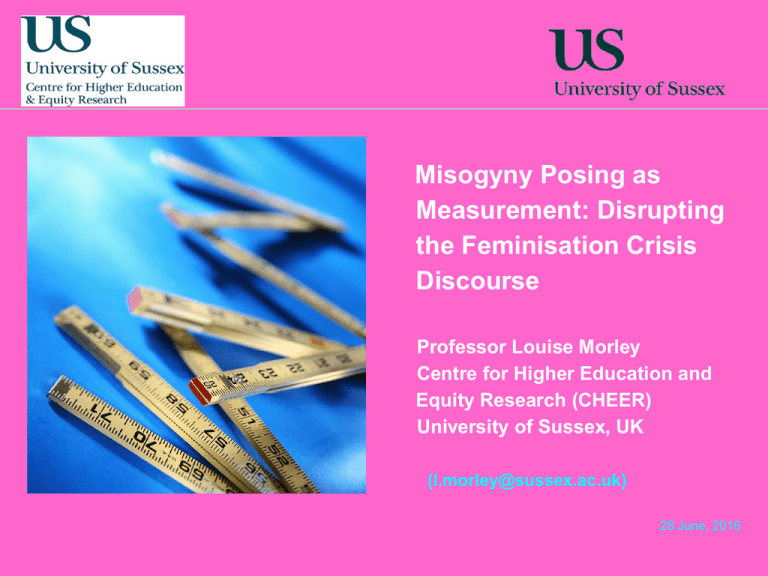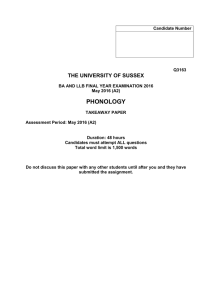Misogyny Posing as Measurement: Disrupting the feminisation crisis discourse
advertisement

Misogyny Posing as Measurement: Disrupting the Feminisation Crisis Discourse Professor Louise Morley Centre for Higher Education and Equity Research (CHEER) University of Sussex, UK (l.morley@sussex.ac.uk) 28 June, 2016 Closing the Gender Gap • Number of male students globally quadrupled from 17.7 to 75.1 million between 1970-2007. • Number of female students rose sixfold from 10.8 to 77.4 million. • Global Gender Parity Index of 1.08 (UNESCO, 2009). 28 June, 2016 Women as Pollutants • In 2004, Dame Carol Black (then President of the Royal College of Physicians): • Increasing numbers of women in medicine might lead to the profession losing status and influence. (Lurie, 1993; Whitcomb, 2004) • ‘dominant position of females’ (HEPI Report, 2009:3) 28 June, 2016 Post-Feminism/ New Gender Regimes • Narratives of crisis used to justify a return to values perceived as being under threat. • Declaration of crisis reads facts/figures to become a declaration of war against the source of threat (Ahmed, 2004). • Young women’s assemblage for productivity/ phallic girls/ vengeful patriarchal norms reinstated (McRobbie, 2007). • The duality of sexual difference is reconfirmed. • Gender norms are re-consolidated and re-stabilised (Blackmore, 2010). 28 June, 2016 Crisis Discourse of Feminisation • Reinforces gender dichotomy/ binary frame/ seesaw; • Is about fear of the ‘Other’/ disparagement of difference; • Underpinned by essentialism; • Reduces gender to quantitative change/ confusing sex and gender; • About hyper-visibility i.e. women as dangerous; • Suggests a breach of social norms. (Leathwood and Read, 2009) 28 June, 2016 Whose Academy is it Anyway? • Male Academy = Hosts/ Victims • Female Students = Abusive Guests • A woman’s place is in the minority • Newcomers not knowing their place • A ceiling on women’s participation? • Reminiscent of immigration discourses (invasion fears). 28 June, 2016 Feminisation= Damaging/Emasculating Men? • Dominant group reconstructed as victims; • Assumption that women’s success has come about by damaging men; • White male injury now read as the same as subaltern injury. • If atmospheric oestrogens don’t get them, women’s education and economic independence will. 28 June, 2016 Decontextualised, Common-sense nonAnalytical Understanding of Gender? • Fails to challenge wider gendered power relations; • Fails to increase women’s rights in wider civil society; • Allows women to succeed in HE, but not in labour market. • Positions women as (turbo charged) consumers, but not in powerful positions as knowledge producers/ gatekeepers. 28 June, 2016 The Higher Educated (overperforming) Woman is Responsible for... societal destabilisation; a crisis in masculinity; devaluing of professions/ academic credentials/ institutions; detraditionalisation. 28 June, 2016 Undoing Gender (Butler, 2004) Feminisation = • Resistance to distributive justice • Subversion of gender equality • Individual, not collective rights • Re-doing of gender. How to build on the momentum of women’s increased participation: • to undo gender in the academy • transform knowledge production • imagine a different future for higher education? 28 June, 2016 Centre for Higher Education and Equity Research (CHEER) • ESRC Seminar Series: ‘Imagining the University of the Future’ • http://www.sussex.ac.uk/cheer/esrc seminars Special issue of Contemporary Social Science (Volume 6:2, 2011) entitled: ‘Challenge, Change or Crisis in Global Higher Education?’ 28 June, 2016

